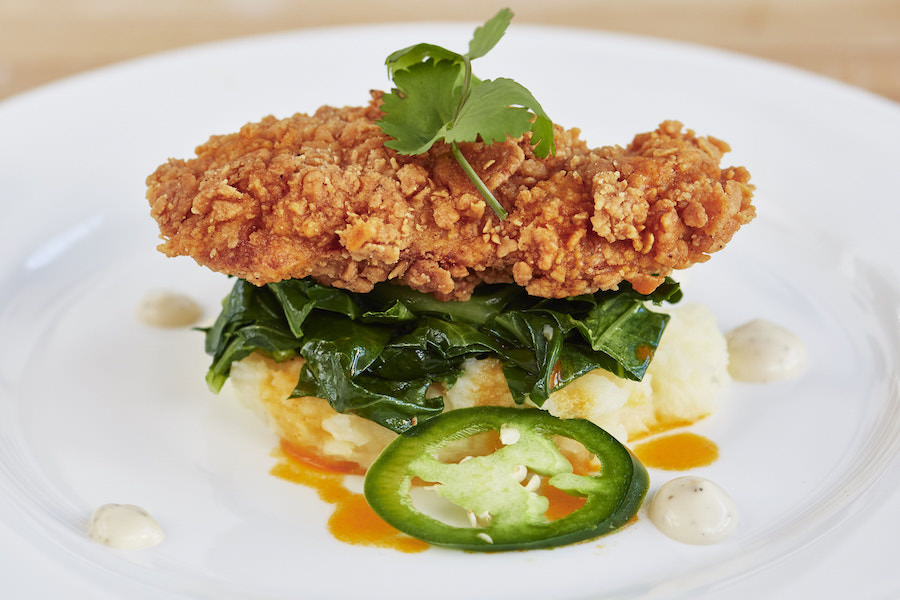Would You Eat Chicken Grown in a Lab?
In the future your fried chicken may be coming from a lab rather than the farm, if the San Francisco-based Startup Memphis Meats has anything to say about it.
Would You Eat Chicken Grown in a Lab?
In the future your fried chicken may be coming from a lab rather than the farm, if the San Francisco-based Startup Memphis Meats has anything to say about it.

Lab-grown beef has been around for awhile – it was first produced in 2013, though it’s not yet available to consumers as its makers continue research ways to get its incredibly high production costs down – but this is a first for poultry. Uma Valeti, co-founder and CEO of Memphis Meats, the company behind these new products, gave Modern Farmer a rundown on how it’s produced.
“We start with animal cells that have the ability to self-renew,” he told us in an email (he’s referring to stem cells, which naturally divide and eventually create tissue, collected from the animal). “We then feed these cells rich nutrients including vitamins, minerals and plants (the same way you’d feed grass to a cow), and let them grow into protein-packed meat. Once the meat has achieved the desired tenderness, we harvest it, and it is ready to be cooked.”

While beef is a heavily-consumed meat – the company created a beef meatball last year – chicken is wildly popular pretty much everywhere, and duck, while not incredibly prevalent in the U.S., is a staple protein elsewhere in the world, most notably China, which consumes six billion pounds of it per year.
The company says its products, which they refer to as “clean meat,” are better than traditionally produced chicken, beef, and duck since there are fewer environmental consequences (as well as ethical issues, in the minds of some folks) associated with raising and slaughtering animals. Memphis Meat’s method of producing animal protein would require less than a tenth of the land and water, and less than half of the energy conventional meat needs, says Valeti. Plus, there’s the animal welfare issues of conventionally produced meat and the problems of food borne illnesses, such as salmonella and E. coli, which they say is much less of an issue with their method of production. (Bacterial contamination most often occurs through contact with infected animal feces. That isn’t as problematic when you’re talking about producing meat in a sterile environment without the animal and it’s bodily functions getting in the way.)
But here’s the $50,000 question: will consumers eat meat grown in a lab? Valeti believes so. “We find that once people become aware of our meat – and the many benefits it can offer to the body, the planet and the animals – they become overwhelmingly enthusiastic about the products. We believe that as long as people are informed, they will enthusiastically embrace our movement,” he says.
Even if you’re cool with this idea, you’ll have to wait awhile before you can purchase the meat – four years, according to Valeti, which is when he says they’ll be able to “significantly reduce the cost of production.” (Right now, it costs about $9,000 a to produce a pound of Memphis Meats’ poultry, Digital Trends reported).
“We’ve already reduced the cost of production by more than 100-fold since we started our research,” he says. “And while we might initially enter the market at a slight price premium, as we scale-up we are confident we will be able to produce meat at a price that is cost competitive with (and ultimately more affordable than) conventionally-produced meat.”
Follow us

This work is licensed under a Creative Commons Attribution-NoDerivatives 4.0 International License.
Want to republish a Modern Farmer story?
We are happy for Modern Farmer stories to be shared, and encourage you to republish our articles for your audience. When doing so, we ask that you follow these guidelines:
Please credit us and our writers
For the author byline, please use “Author Name, Modern Farmer.” At the top of our stories, if on the web, please include this text and link: “This story was originally published by Modern Farmer.”
Please make sure to include a link back to either our home page or the article URL.
At the bottom of the story, please include the following text:
“Modern Farmer is a nonprofit initiative dedicated to raising awareness and catalyzing action at the intersection of food, agriculture, and society. Read more at <link>Modern Farmer</link>.”
Use our widget
We’d like to be able to track our stories, so we ask that if you republish our content, you do so using our widget (located on the left hand side of the article). The HTML code has a built-in tracker that tells us the data and domain where the story was published, as well as view counts.
Check the image requirements
It’s your responsibility to confirm you're licensed to republish images in our articles. Some images, such as those from commercial providers, don't allow their images to be republished without permission or payment. Copyright terms are generally listed in the image caption and attribution. You are welcome to omit our images or substitute with your own. Charts and interactive graphics follow the same rules.
Don’t change too much. Or, ask us first.
Articles must be republished in their entirety. It’s okay to change references to time (“today” to “yesterday”) or location (“Iowa City, IA” to “here”). But please keep everything else the same.
If you feel strongly that a more material edit needs to be made, get in touch with us at [email protected]. We’re happy to discuss it with the original author, but we must have prior approval for changes before publication.
Special cases
Extracts. You may run the first few lines or paragraphs of the article and then say: “Read the full article at Modern Farmer” with a link back to the original article.
Quotes. You may quote authors provided you include a link back to the article URL.
Translations. These require writer approval. To inquire about translation of a Modern Farmer article, contact us at [email protected]
Signed consent / copyright release forms. These are not required, provided you are following these guidelines.
Print. Articles can be republished in print under these same rules, with the exception that you do not need to include the links.
Tag us
When sharing the story on social media, please tag us using the following: - Twitter (@ModFarm) - Facebook (@ModernFarmerMedia) - Instagram (@modfarm)
Use our content respectfully
Modern Farmer is a nonprofit and as such we share our content for free and in good faith in order to reach new audiences. Respectfully,
No selling ads against our stories. It’s okay to put our stories on pages with ads.
Don’t republish our material wholesale, or automatically; you need to select stories to be republished individually.
You have no rights to sell, license, syndicate, or otherwise represent yourself as the authorized owner of our material to any third parties. This means that you cannot actively publish or submit our work for syndication to third party platforms or apps like Apple News or Google News. We understand that publishers cannot fully control when certain third parties automatically summarize or crawl content from publishers’ own sites.
Keep in touch
We want to hear from you if you love Modern Farmer content, have a collaboration idea, or anything else to share. As a nonprofit outlet, we work in service of our community and are always open to comments, feedback, and ideas. Contact us at [email protected].by Andrew Amelinckx, Modern Farmer
March 21, 2017
Modern Farmer Weekly
Solutions Hub
Innovations, ideas and inspiration. Actionable solutions for a resilient food system.
ExploreExplore other topics
Share With Us
We want to hear from Modern Farmer readers who have thoughtful commentary, actionable solutions, or helpful ideas to share.
SubmitNecessary cookies are absolutely essential for the website to function properly. This category only includes cookies that ensures basic functionalities and security features of the website. These cookies do not store any personal information.
Any cookies that may not be particularly necessary for the website to function and are used specifically to collect user personal data via analytics, ads, other embedded contents are termed as non-necessary cookies.
Are you INSANE ??? NFW !!!! I raise free range chickens to for the Best quality meat and eggs, I’m an organic farmer who uses Aquaponics to grow my own produce, and protein and I purchase Free Range, Grass Fed Bison, free from antibiotics and other chemicals. My Golden Retriever’s eat only a safe fresh meat based diet.
No way will I ever eat GMO plants nor eat Franken-Meats !!